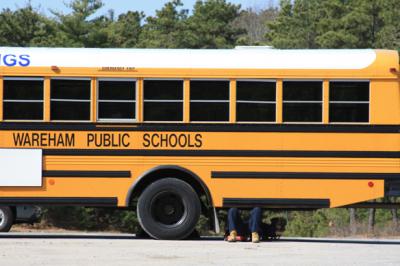School Committee examines bus bids, votes for district to continue transportation
After examining four bids outlining the yearly costs for private companies to take over Wareham Public Schools' entire busing operation, the School Committee voted Wednesday not to accept any, citing that the district could continue to operate its own fleet, replace aging buses, and still save money per year.
Superintendent Dr. Barry Rabinovitch presented the bids to the committee, along with a possible method of replacing older buses. The bidding process began after citizens raised concerns about the safety of the district's fleet and suggested that the town could save money and get newer, safer buses by outsourcing services to private vendors. The School Department received the bids in December.
Tremblay's Bus Company indicated that it would charge $3.1 million per year to run the operation. Birnie Bus Service bid approximately $2.8 million, First Student bid roughly $2.5 million, and Durham School Services bid around $2.4 million.
Including fuel costs, which was not part of the bids, Wareham Public Schools pays roughly $1.5 million to operate and maintain its fleet, Rabinovitch said. Compared with the lowest bid, the district saves more than $1 million per year.
Addressing the issue of the aging fleet, Rabinovitch presented information indicating that the district could enter into a five-year lease-to-own agreement to replace 29 of its oldest vehicles. That would decrease the average age of the vehicles in the fleet to roughly 2.8 years, compared to the current average of nine years, and still save roughly $500,000 per year in comparison to the lowest bid, he said.
After the five year lease, Rabinovitch suggested that the district replace its remaining 16 buses.
"It would get us on a regular replacement schedule," Rabinovitch said.
School Committee member Geoff Swett pointed out that the district would have to replace buses every year in order to maintain the low average age of the buses, but noted that even doing that would save the district cash in comparison to the lowest bidder.
In response to an inquiry from School Committee member Rhonda Veugen about how the town would fund such a replacement plan, Rabinovitch suggested asking voters at Town Meeting to approve an increase in the meal tax, which he said results in an average revenue increase of $400,000 per year.
Rabinovitch said he would work with Town Administrator Mark Andrews and the Capital Planning Committee, which plans for such big purchases, in determining how to move forward.
"The issue is, there isn't enough revenue to do as much as [the Capital Planning Committee] need[s] to, and that's why it has to be looked at creatively," Rabinovitch said.
Andrews put out a separate bid request for 30 new or near-new buses by way of a "reverse auction," under which potential bidders were identified through a screening process and then invited to bid via the Internet during a specific time period in December. Only one bidder emerged, however, so the auction could not take place.
In other bus business, Transportation Manager Jeff Tatro indicated that roughly 75 percent of the district's fleet immediately passed the most recent Registry of Motor Vehicles inspection. A bus was taken off the road for repairs to rust on the interior body. The other failed inspections were for various issues, which were fixed and passed the same day.















